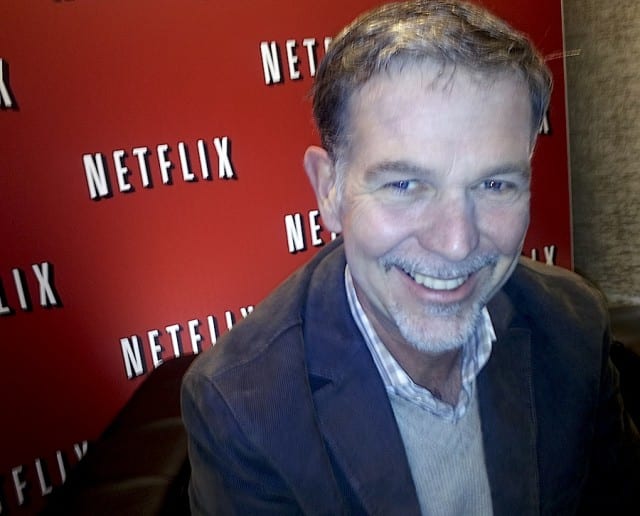
Netflix (NSDQ: NFLX) CEO Reed Hastings tells paidContent the company has emerged from the “pain” of a consumer and investor backlash, after last year’s botched attempts at splitting the company.
http://www.youtube.com/v/DTOR0aHFjyM?version=3&hl=en_US
Netflix’s market cap has halved by $6 billion and it lost 805,000 subscribers after it said it would separate its DVD subscriptions from online in a new business called Qwikster, prompting scathing criticism.
“It felt bad, that’s what you would expect,” Hastings told me, whilst in London to unveil the company’s UK and Ireland expansion. “That hurt us in the U.S. market.
“We’re mostly over that transition because of the separation. I mean, it was painful, but now DVD and streaming are really separate services and they run pretty independently in Netflix. Streaming is the majority of subscribers now; DVD is shrinking.”
Hastings said Netflix is “growing nicely on streaming”, which showed two billion hours of consumer use during Q4. Netflix’s share price has rebounded by 30 percent since that January 4 disclosure.
“People have realised, ‘they might have been imperfect on the DVD side in the U.S., but U.S. streaming’s always been $7.99 and is continuing to grow like a rocket,” Hastings added.
The company is sticking to its recent forecast that, despite negative consumer growth in October and November, December would turn up.
Stock impact
Asked whether the Wall Street alarm has caused him to be conscious of the market impact of strategy decisions, Hastings told paidContent: “The stock price is the outcome of consumers. Mostly we focus on consumers.
“If we can have consumers be excited about our service and grow, the stock price will do fine. When we angered the consumers, as we did with the DVD price increase, then the stock price doesn’t do well. But it’s an output, we don’t really focus on it per se. But we don’t ignore it.”

Sever the past
Though it aborted the Qwikster brand, Netflix went ahead with splitting its DVD and online operations, requiring individual accounts from new subscribers and double subscriptions from existing hybrid customers who want to retain both formats.
In broad terms, Hastings was criticised for the sensitivity with which Netflix, like a growing number of services, is trying to make a great leap forward, migrating its business from legacy physical media to a purely digital future.
“The peak was a year ago – DVDs have been shrinking all year long,” he told me. “Streaming has been growing really fast.
“The smart TV revolution is just beginning. Broadcast TV is like the land line – people still have some land lines but mobile is most of telephony. Internet TV will grow like it has for mobile in the last few years.”
Starz deal ending
But challenges remain, notably as content owners front up to Netflix. Its Starz deal expires in February, HBO has stopped discounting DVDs Netflix must buy and Warner has doubled the length of time after movies are released before Netflix can take them on.
Hastings says the loss of Starz won’t have a big effect. “The Starz deal has both Disney (NYSE: DIS) and Sony (NYSE: SNE) output. We dropped the Sony output a long time ago, so really that drop is about 15 Disney movies which will drop off Netflix. That constitutes about two percent of our domestic viewing. It sounds a lot bigger than it is.”
Hastings revealed Netflix raised $400 million through private equity recently to satisfy such content owners. “You never want your suppliers to be nervous about payment,” he told me. “So it’s better to raise a bunch of money. It didn’t cost us that much. Then the suppliers are not nervous at all. We don’t expect to ever need it. But that’s when you want to raise it.”
International losses
As the company balances physical with digital and domestic discontent with international expansion, it expects to score losses through 2012. Losses from non-U.S. operations were forecast to hit $60 to $70 million in Q4 alone. “That’ll grow,” said Hastings, who won’t commit to expecting a return to profit in 2013.
The UK and Ireland launches are costing “tens of millions” despite not employing any local staff, and Hastings won’t forecast a future profit date there, not even in three years’ time.
“We’ll see how it goes,” he says. “We’re not really focused on the short-term profits, we’re focused on the long-term market opportunity.”